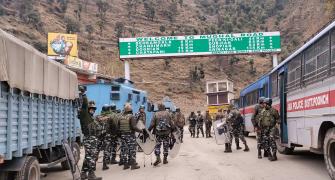Indian manufacturers, who serve global markets, are always in need of high-level automation to manufacture goods with precision, greater machine speeds and less time-to-market. Since we are in the business of industrial automation, we sense a great opportunity here," the $5 billion Rockwell Automation president and CEO, Keith Nosbusch, told Business Standard.
Nosbusch, on his second visit to India, was in Mumbai "to learn more about the Indian market since India is very important to our business strategy".
Headquartered in the US, Rockwell is well known for the Allen-Bradley brand that is found in many factories. Close home, Allen-Bradley components, for instance, have a major presence in the Tata Indica.
Rockwell recently acquired Datasweep, which has expertise in plant-wide information systems. "We will continue to evaluate the scene and there are bound to be more acquisitions in the future," he said.
Rockwell Automation India, which employs around 180 employees, has a turnover of around $70 million. Nosbusch wants it to grow at over 20 per cent annually in India.
Globally, Rockwell has committed itself to a six per cent annual growth. Nosbusch appears to be betting big on India to meet the figures. The country is Rockwell's fastest growing centre in the Asia-Pacific region.
What makes Nosbusch so bullish about India? "Indian manufacturing is looking up. The current Indian market potential for our business is around Rs 500 crore. We have around 30 per cent market share in programmable logic controllers (PLCs, used in computer numerical control or CNC machines that are the heart of a factory floor). We have specific offerings for the FMCG and the automobile sectors that are doing well," said Nosbusch.
Rockwell claims to be a leader in the discrete space primarily the engineering and automobile sector with machine builders and auto companies as its major customers.
It is now entering the domain of process industries broadly involving a chemical process rather than engineering or fabrication that is dominated by the likes of Siemens and Emerson Process till date.
The market in India for Distributed Control Systems (DCS), used in process industries, is forecasted to grow at 17.4 per cent CAGR over the next five years.
It is expected to exceed $450 million in 2009, according to a recent ARC study. The sectors such as power, oil and gas, waste water, food and life sciences continue to remain large users of DCS.
"The Control Logix of Rockwell addresses the hybrid process space. Customers need to simply add controllers rather than assemble a new product. This reduces the total cost of ownership and also reduces the time to market, which is very important for manufacturers," Nosbusch said.
A report recently published by Lehman Brothers, a research company, corroborates Nosbusch's claim. The report addressed single-controller technology and compared Rockwell Automation's hybrid control capabilities to other major global automation players.
It concluded, among other things, that: "Rockwell Automation's Logix Integrated Architecture is a fundamentally new game-changing technology that is unique among the major control industry competitors."
"What's unique about the Integrated (Logix) Architecture is that it is a platform to untilise evolving technology. You do not have to increase your investment when the technology changes. Our customers want to protect their investments since they have very long lifecycles around 30 years in many cases. With the Integrated Architecture, they can go through three generations of technology, thus protecting 70-80 per cent of their investments. You cannot dismantle and assemble factories every second year," Nosbusch said.
Rockwell faces competition from the Japanese who resort to aggressive marketing and whose products are competitively priced. However, Nosbusch disagrees.
"While the Japanese are technically very strong, they primarily serve the Japanese OEM (original equipment manufacturer) community. We have a global spread and use open technologies." he said.
At a recent automation fair in St Louis, US, Nosbusch had also spoken of "safety as a best practice for industries".
He elaborated that safety was now being integrated with the control platform, hence there would be "no need for additional networks, controllers or input/output cards".
"This would help manufacturers reduce their cost by around 30 per cent, not to mention savings by way of no additional maintenance, training and implementation costs," he said.








